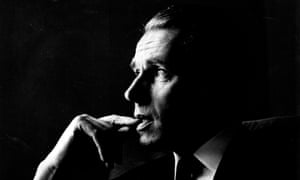There is a theory that George Martin
was a man who got incredibly lucky the day he met the Beatles. It’s a
theory that was sometimes posited by the Beatles themselves, in their
less gracious moments. “When people ask me questions about ‘What did
George Martin really do for you?’ I have only one answer. ‘What does he
do now?’” wrote John Lennon in 1971. “It’s not a putdown, it’s the
truth.”
Certainly, life would have turned out very differently for George Martin had the general manager of a publishing company called Ardmore and Beechwood not rung him in early 1962, suggesting he meet with Brian Epstein to discuss his charges, who had already been turned down by Decca and Pye: he might have remained among EMI’s massed ranks of staff producers, handy with a sound effect when the kind of comedy records he specialised in before he met them demanded it. And perhaps if the Beatles had hooked up instead with Joe Meek, the tormented, volatile experimental genius of 60s British pop production, he’d have come up with something even more inventive and thrilling than the wintry strings that perfectly underscore Eleanor Rigby’s despondent solitude, although it’s hard to see how. Perhaps if Brian Wilson had been sitting in the control room, instead of the urbane former boss of Parlophone Records, John Lennon would have got closer to his brief that Tomorrow Never Knows should sound like a hundred chanting Tibetan monks.
Certainly, life would have turned out very differently for George Martin had the general manager of a publishing company called Ardmore and Beechwood not rung him in early 1962, suggesting he meet with Brian Epstein to discuss his charges, who had already been turned down by Decca and Pye: he might have remained among EMI’s massed ranks of staff producers, handy with a sound effect when the kind of comedy records he specialised in before he met them demanded it. And perhaps if the Beatles had hooked up instead with Joe Meek, the tormented, volatile experimental genius of 60s British pop production, he’d have come up with something even more inventive and thrilling than the wintry strings that perfectly underscore Eleanor Rigby’s despondent solitude, although it’s hard to see how. Perhaps if Brian Wilson had been sitting in the control room, instead of the urbane former boss of Parlophone Records, John Lennon would have got closer to his brief that Tomorrow Never Knows should sound like a hundred chanting Tibetan monks.
They would doubtless have been welcomed with open arms at Gold Star or United Western, but the Beatles seemed to realise on what side their bread was buttered. They clearly understood that a weird creative synergy had existed between them and Martin from the start. On their Decca audition tape, the Beatles sounded reedy and timid and knock-kneed, a shadow of the band who would record music as vibrant and compelling as I Saw Her Standing There or Lennon’s raw-throated take on Twist and Shout a year later. In the intervening period, Martin had not merely signed the band, but identified drummer Pete Best as a weak link, suggested they dramatically speed up a “dreary” Roy Orbisonish Lennon and McCartney ballad called Please Please Me, thus securing them their first No 1, and put them at such ease in the studio that they could record their entire debut album in just over 12 hours.
He described the Beatles’ split as a relief – “I wanted to live my own life” – but like everyone closely involved with the Beatles, and indeed the Beatles themselves, Martin struggled slightly to adjust to life without them. He had become an independent producer in 1965, and produced other artists in the 60s that demonstrated his versatility – big orchestral ballads for Cilla Black, Shirley Bassey’s Goldfinger, tough mod R&B for the Action – and had released a couple of visionary instrumental singles: 1962’s Time Beat was an electronic collaboration with the BBC Radiophonic Workshop’s Maddalena Fagandini; 1967’s magnificent Theme One, a swirling, heavily phased fanfare commissioned for the launch of Radio 1, bedecked with Sgt Pepperish strings and later covered by prog rockers Van Der Graaf Generator. But it was all, inevitably, overshadowed by the Beatles, as was the stuff Martin did next: albums for US soft-rockers America and jazz-rock fusion legends the Mahavishnu Orchestra, the establishment of his own Air Studios in London and Montserrat. The latter location in the Caribbean was, perhaps understandably, hugely popular with the rock aristocracy in the 80s – Elton John recorded there, so did the Police and Dire Straits – but was destroyed by a hurricane in 1989.

No comments:
Post a Comment